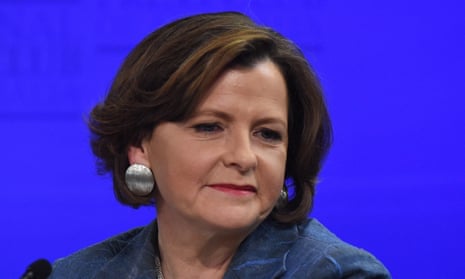The president of the Australian Council of Trade Unions, Ged Kearney, has withdrawn from the government’s advisory body on skilled migration in protest at changes to temporary work visas.
Kearney has accused the Coalition of failing to consult its own ministerial advisory council on skilled migration about the abolition of 457 visas in favour of two new temporary visa classes.
In a letter sent on Thursday to the Australian Industry Group chief executive, Innes Willox, who chairs the council, Kearney also set out the union movement’s substantive objections to the new scheme, which it believes fails to crack down on rorts and the exploitation of workers.
Kearney said the changes had not been discussed at the council and she had concluded it was therefore “an ineffective body that has been ignored by the government and our recommendations have become irrelevant”.
The ACTU president said that the council was “not sufficiently independent from government” and unbalanced. Kearney noted that she was the only unionist on a body that should be “genuinely tripartite” with equal representatives from unions, employers and others.
On Tuesday when the temporary work visa changes were announced, the immigration minister, Peter Dutton, said the government had “had some discussions with employer groups” about the changes.
Asked about consultation, Dutton claimed the changes “come off the back” of the John Azarias review and the government had “picked up many of the recommendations that he made in that review”.
That review, published in September 2014, backed Kearney’s call for the advisory council to be replaced with a tripartite body to consult on skilled migration, which the government itself supported.
A further two recommendations, supported by the Abbott government, called for English-language requirements to be eased, although the Turnbull government’s changes now require a higher standard for four-year skilled visas.
In her substantive attack on the changes, Kearney said the new visa scheme was “457-lite” because it still left hundreds of occupations on the list for which there were not shortages in Australia, including roof tilers, carpenters, joiners, chefs, cooks, midwives, nurses and real estate agents.
She pointed to a Labor analysis that fewer than one in 10 jobs had been eliminated from the scheme.
The ACTU president argued the new scheme left employers in charge of labour market testing, allowing them to “advertise on Facebook for one week” to satisfy the requirement. Kearney also said, “employers can just circumvent the system by picking a different visa instead”, citing the fact the China Australia free-trade agreement allows an “unlimited numbers of workers, like electricians, to be brought in without labour market testing or proper skills checking”.
She argued the new reforms did nothing to stop employers rorting the scheme by classifying sales assistants as marketing managers, kitchen hands as pastry cooks, payroll clerks as accountants, and sex workers as massage therapists.
Other visa classes such as student and working holiday-maker visas were still vulnerable to exploitation, she said, citing scandals in the farm sector and in franchises including 7-Eleven.
Employer groups including the Australian Chamber of Commerce and Industry and Ai Group have welcomed the changes as a means to improve the credibility of the 457 visa system.
But the Business Council of Australia has warned companies’ capacity to get skilled workers must be improved not degraded and the Small Business Council has rejected “arbitrary” limits on small firms ability to hire skilled foreign workers.
On Friday Willox said he was disappointed Kearney had resigned, crediting her with having made “a valuable contribution to the group which considered the full range of immigration issues related to skilled migration and the Australian workforce”.
“Much of what was covered in this week’s 457 visa announcement was discussed by MACSM members over the past 18 months,” he said, explaining that the body only provided advice but it was up to the government to make final policy decisions.
“Like other organisations the ACTU remains free to contribute their views to the MACSM but obviously now without a seat at the table,” Willox said.
Guardian Australia contacted Dutton for comment.
